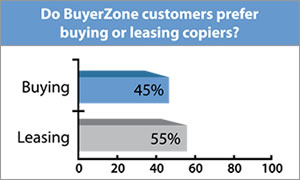Is a Copier Lease The Right Choice for You?

BuyerZone user data, Q4 2013
Buying an office copier is an expensive proposition: mid-level business copiers cost $5,000 to $10,000, with high-end models reaching up to $40,000. And copiers are notorious for requiring frequent service, due to toner and bits of paper gumming up the sensitive machinery. For these reasons and more, copier leasing is an attractive choice for many businesses, as the graph here shows: 55% of our users prefer leasing their copiers.
Small business owners tell us that their primary reason to lease is financial: a copier lease lets them avoid the significant capital outlay required to purchase one outright. In addition, because the technology changes quickly, copier leases often include provisions to trade up to a newer model, allowing a pain-free upgrade. Other leases allow you to walk away from a copy machine, increasing your financial flexibility if you can't afford ongoing monthly payments. Finally, leasing will always include a service contract that will help ensure you copier is always running as expected.
As with most products, however, leasing a photocopier is more expensive in the long run, so if your copier will get significant use over an extended period of time, you may come out ahead by purchasing it and adding on a high-quality service contract. If you do chose to lease, many leases charge on a per-copy basis and may include monthly copying minimums. To avoid paying a penalty, make sure your copy volume estimates are reasonable. Low-balling your estimate may save you a few dollars a month on the lease, but you'll likely overtax the copy machine and have to deal with more repairs and downtime than you'd like. And overestimating can come back to hurt you by driving costs up when you don't meet the minimums.
Service agreements
As described above, a key benefit of copier leasing is that most leases include the maintenance required to keep your copier running smoothly, including "parts" and labor. Watch out, though: different vendors may define what parts are covered very differently. Parts that break during use are almost always covered, but parts that wear out over time may or may not be included. This includes fuser rollers, cleaning blades, and other parts often bundled in preventative maintenance kits. Make sure you get a comprehensive list of what is and is not covered so you can compare plans accurately.
Consumables like paper and toner are hardly ever included in standard service agreements. Your dealer may offer you an all-inclusive copier lease that does cover the consumables, but you'll almost always save money buying those products at an office supply store instead. And if your dealer tries to claim that you have to buy your consumables through them, start looking for another dealer: such a claim isn't legal or ethical.
Emergency repairs
Your service agreement should cover the costs of most emergency repairs -- but exactly what's covered can vary. Find out if there is any hourly cost for service calls, and be sure to get a written commitment on response time: the typical maximum is four hours. If you expect to use the copier during evenings and weekends, be sure to find out what coverage is available during those times.
Don't forget to ask about loaner service, too. Many vendors will provide you with a replacement copier of equal or greater specifications if yours requires significant repairs.
Copier leasing tips
- When not to: If you expect to make fewer than 700 copies a month, you probably don't need to lease a "business" copier. You would be better off purchasing a small office copier from an office superstore - unless you want the advanced features or service guarantees that come with business copiers.
- Know the features you need: Don't get sucked into an expensive contract that provides more than your small business actually needs. Explore leasing options that can give you an idea for the features you'll need while demonstrating the basics of a copier.
- Don't be too brand-conscious: Businesses can choose between multiple brands when looking to lease a copier, including HP, Sharp, Xerox, Brother, Toshiba, Samsung, and many more. In almost all cases, the features and specs of the copier are more important to the success of your lease than the actual brand on the machine. However, if you're leasing multiple copiers, it does make sense to stick with one brand, as that makes ongoing maintenance simpler and makes it easier for your users to switch between different machines when needed.
- Test drive it: When deciding between two or three copy machines to lease, ask the dealer to bring the machines for a demo. If an in-house demo is not possible, make sure you visit the dealer to see how the machines work.
- Protect your critical data: Modern printers routinely save the documents they're printing or copying on internal hard drives. When you return the device at the end of your lease, make sure the dealer shows you how to reset the storage so none of your confidential information is put at risk.
- Compare multiple suppliers: Before you settle on a particular copier or vendor, you should compare copier lease rates from several sellers to make sure you get the right machine at the right price.